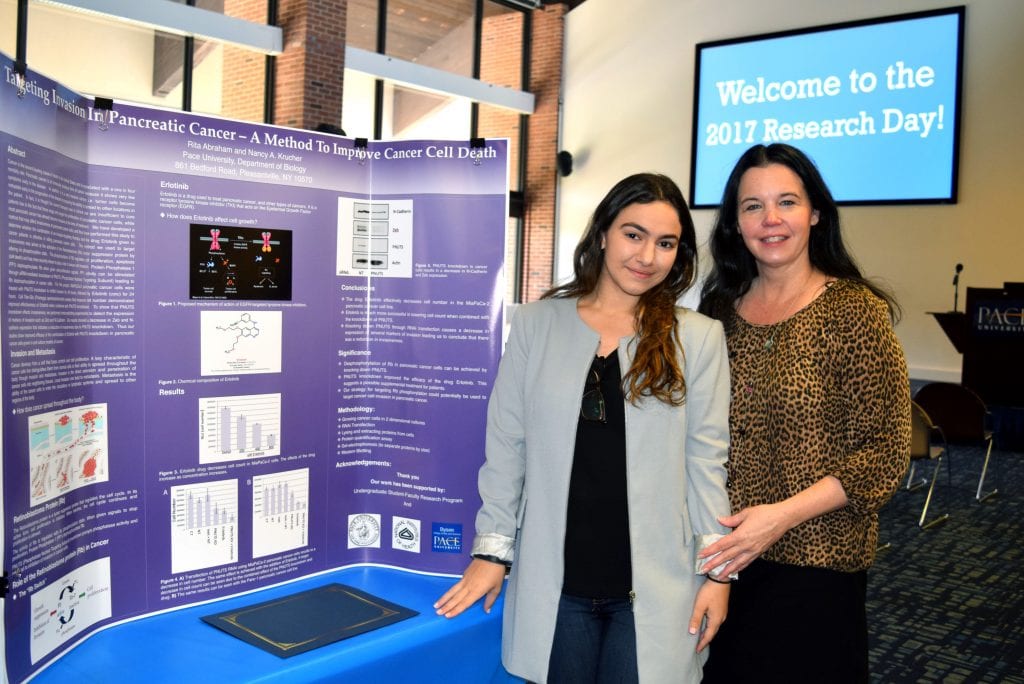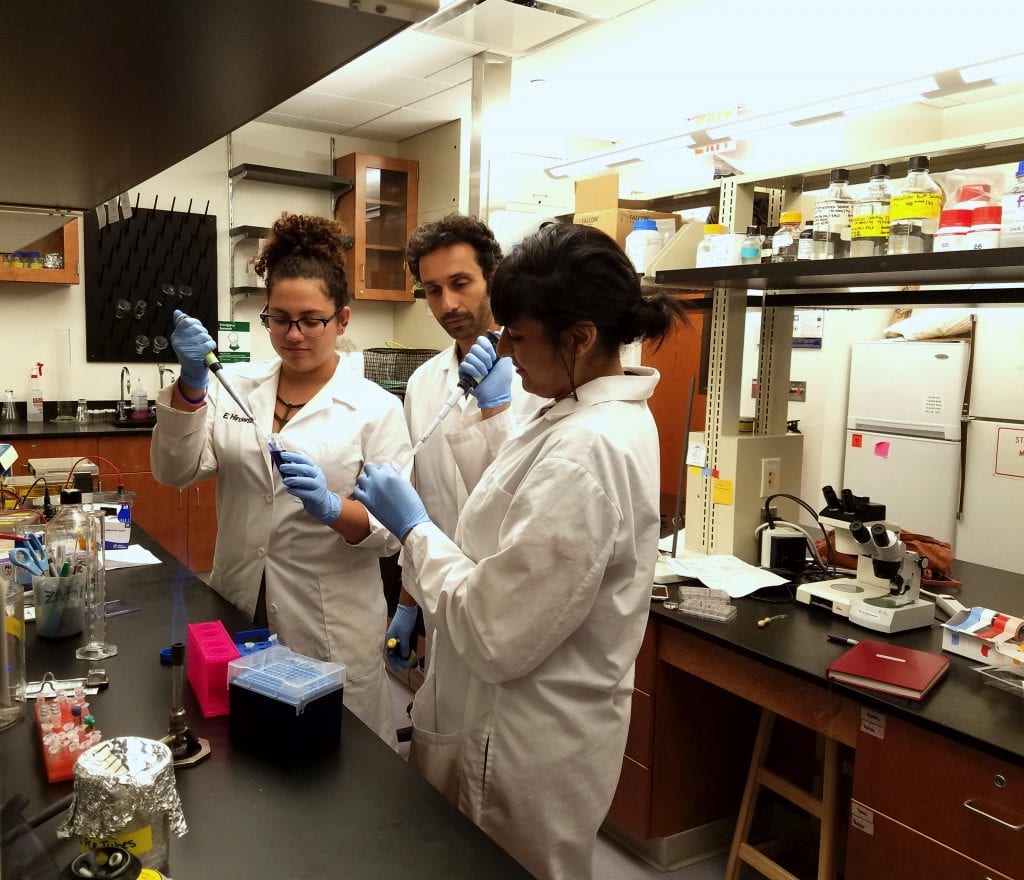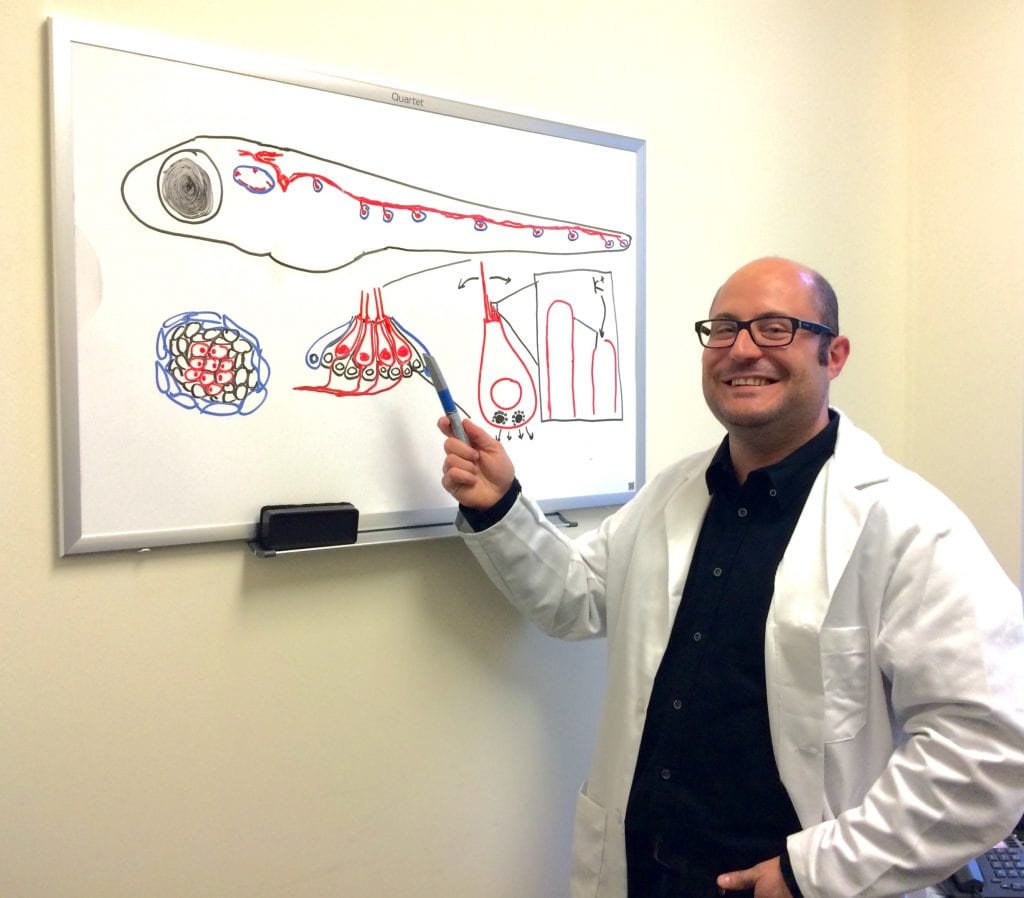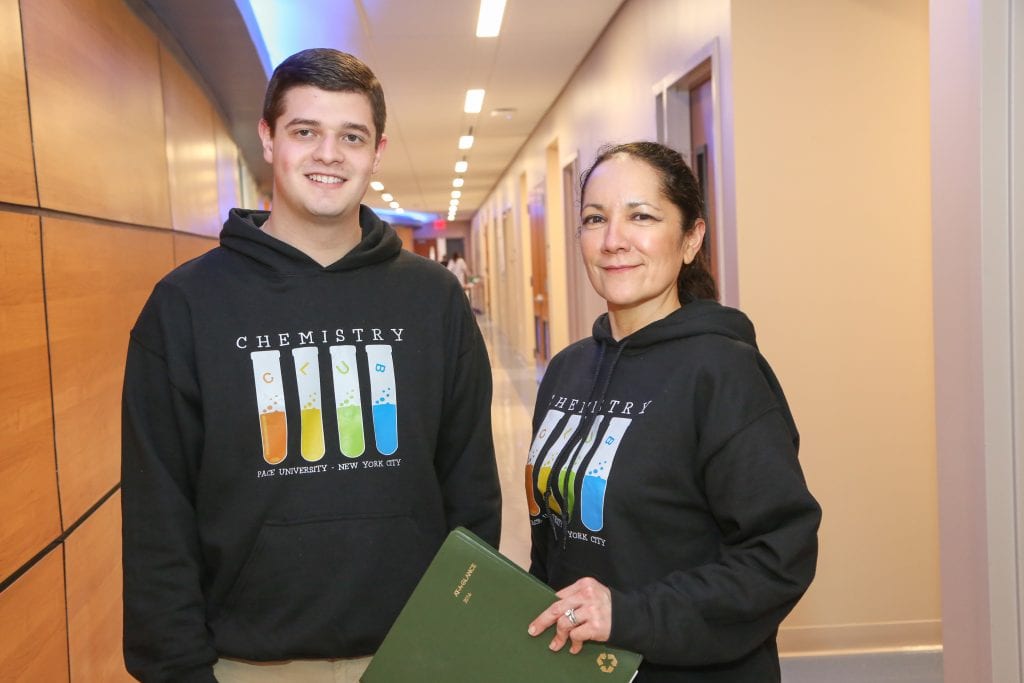Hands-on academic examination is one of the hallmarks of a Pace education, and Dyson students and faculty are at the forefront of some world-class research across the scientific spectrum. In the last year, on the New York City campus, they have explored ways to stop the spread of diseases and infections through the development of a new patented antimicrobial compound, studied the molecular underpinnings of neurological diseases such as epilepsy, and examined enhanced sampling preparation methods for extraction in multiple research fields. On the Pleasantville campus, they successfully stopped the proliferation of breast and pancreatic cancer cells, developed new ecological software for modeling geographic distributions of wildlife species, and made strides in reducing human hearing loss through the unlikely study of fish.
Click on a professor’s name below to learn more about their pioneering work and its impact.
Nancy Krucher

Rita Abraham ‘18, Biology, and Professor Nancy Krucher
Professor of Biology Nancy Krucher studies how cancer cells function, with a specific interest in the ability of certain proteins within cells to stop the cancer from growing. The Retinoblastoma (Rb) protein, one of the first proteins shown to regulate cell proliferation, becomes inactive in most types of human cancer. Through her research, Krucher developed a methodology to activate the Rb protein in cancer cells, with the aim of halting the cells’ propagation.
With funding from the National Institutes of Health, Krucher’s earlier work focused on the role of Rb proteins in the proliferation of breast cancer cells. Since 2017, she has been looking at the activation of Rb in pancreatic cancer. Her work has been so successful that in July 2018, she was awarded another grant from the National Institutes of Health, National Cancer Institute. This $399,000 in funding could lead to new treatment strategies for certain types of cancer. It may also support undergraduate research and expose students to hands-on experiences, working alongside Krucher.
![]() Krucher has been able to not only stop cell proliferation, but to cause cancer cell death, including inhibiting the invasive ability of the cells. This research is immensely important because only one-fifth of Americans diagnosed with pancreatic cancer survive for a full year, according to the American Cancer Society, and it is the fourth leading cause of cancer death in the country.
Krucher has been able to not only stop cell proliferation, but to cause cancer cell death, including inhibiting the invasive ability of the cells. This research is immensely important because only one-fifth of Americans diagnosed with pancreatic cancer survive for a full year, according to the American Cancer Society, and it is the fourth leading cause of cancer death in the country.
Zafir Buraei

Zafir Buraei (m)
Assistant Professor of Biology Zafir Buraei has been awarded $372,130 from the National Institutes of Health to pursue several ongoing research projects centered on elucidating the molecular underpinnings of neurological diseases, including Alzheimer’s, epilepsy, migraines, and autism. Buraei and his student team study cells, genetically modified to express the mutant genes, to test various approaches to “normalize” the mutant genes’ functions.
![]() Overall, this research is an important first step toward proposing new therapeutic approaches and allowing for more personalized medicine. With a greater understanding of these mutations, doctors will be able to better prescribe medicine to treat neurological disorders more effectively and with fewer side effects.
Overall, this research is an important first step toward proposing new therapeutic approaches and allowing for more personalized medicine. With a greater understanding of these mutations, doctors will be able to better prescribe medicine to treat neurological disorders more effectively and with fewer side effects.
Aaron Steiner
 Assistant Professor of Biology Aaron Steiner is the recipient of a three-year $378,000 grant from the National Institutes of Health. The funding supports his research on the cellular and molecular processes that enable cell regeneration in fish and other non-mammalian vertebrates, which are analogous to stem cell production of new hair cells in the human inner ear.
Assistant Professor of Biology Aaron Steiner is the recipient of a three-year $378,000 grant from the National Institutes of Health. The funding supports his research on the cellular and molecular processes that enable cell regeneration in fish and other non-mammalian vertebrates, which are analogous to stem cell production of new hair cells in the human inner ear.
![]() Understanding hair-cell recovery in the human inner ear is important because these cells are not naturally regenerated, and losing these cells often causes hearing loss. According to the National Center for Health Statistics, this afflicts as many as 20 percent of Americans. Steiner’s research could potentially identify new paths to stop hearing loss in humans. Scientists from other institutions would also be able to use his research to study a wide range of biological processes, such as how the brain is wired, or how immune cells find and destroy their targets.
Understanding hair-cell recovery in the human inner ear is important because these cells are not naturally regenerated, and losing these cells often causes hearing loss. According to the National Center for Health Statistics, this afflicts as many as 20 percent of Americans. Steiner’s research could potentially identify new paths to stop hearing loss in humans. Scientists from other institutions would also be able to use his research to study a wide range of biological processes, such as how the brain is wired, or how immune cells find and destroy their targets.
JamieLee Rizzo

Kevin Symczak ‘16, Chemistry, and Professor JaimeLee Rizzo
Professor of Chemistry and Physical Sciences JaimeLee Rizzo and co-researchers at Queens College and Long Island University have developed antimicrobial compounds that have been licensed, based on a new patent awarded, for commercial development by the start-up company QuatCare, LLC. Expected to reach the market in 2018, the groundbreaking technology can be bonded to a variety of surfaces, such as cotton cloth, plastic bottles, and wound dressings, offering a speedy, permanent, and eco-friendly reduction of pathogens such as the H1N1 virus, MRSA and other bacteria, and fungi. Rizzo, whose research has closely involved students, was awarded the Homer and Charles Pace Faculty Award, honoring faculty whose commitment to education has had a transformative effect on generations of talented and successful students, at the 2018 Spirit of Pace Awards.
![]() Rizzo’s work can help to stop the spread of deadly diseases and infections. Looking ahead, she and her team plan to develop new compounds to combat new flu virus strains as they emerge.
Rizzo’s work can help to stop the spread of deadly diseases and infections. Looking ahead, she and her team plan to develop new compounds to combat new flu virus strains as they emerge.
Matthew Aiello-Lammens
 Assistant Professor of Environmental Studies and Science Matthew Aiello-Lammens, along with colleagues from City University of New York and Yale University, received a $593,000 grant from the National Science Foundation to develop Wallace, a new open-source ecological software for modeling species niches and geographic distributions that helps make analyses more reproducible and transparent.
Assistant Professor of Environmental Studies and Science Matthew Aiello-Lammens, along with colleagues from City University of New York and Yale University, received a $593,000 grant from the National Science Foundation to develop Wallace, a new open-source ecological software for modeling species niches and geographic distributions that helps make analyses more reproducible and transparent.
![]() One of the major goals of this project is to make it easier for conservation scientists to better understand where species should and could be, therefore deciding which species are at greatest risk for extinction, and thus, where conservation efforts should be focused.
One of the major goals of this project is to make it easier for conservation scientists to better understand where species should and could be, therefore deciding which species are at greatest risk for extinction, and thus, where conservation efforts should be focused.
Elmer-Rico Mojica
 Assistant Professor of Chemistry and Physical Sciences Elmer-Rico Mojica has been awarded a National Science Foundation Major Research Instrumentation (MRI) Program grant for $48,000 to purchase an accelerated solvent extractor.
Assistant Professor of Chemistry and Physical Sciences Elmer-Rico Mojica has been awarded a National Science Foundation Major Research Instrumentation (MRI) Program grant for $48,000 to purchase an accelerated solvent extractor.
![]() This equipment will be used to improve the department’s sampling preparation methods by providing a more advanced instrument to do extraction in different research fields such as natural products, material science, food science, and environmental science. It will also be used in laboratory classes so our students can gain experience in its use.
This equipment will be used to improve the department’s sampling preparation methods by providing a more advanced instrument to do extraction in different research fields such as natural products, material science, food science, and environmental science. It will also be used in laboratory classes so our students can gain experience in its use.

